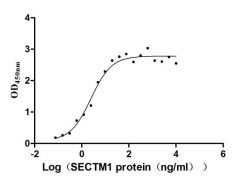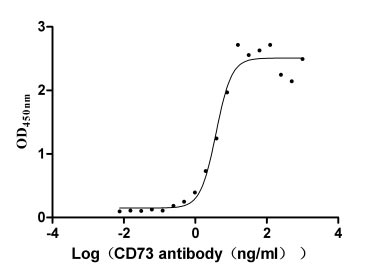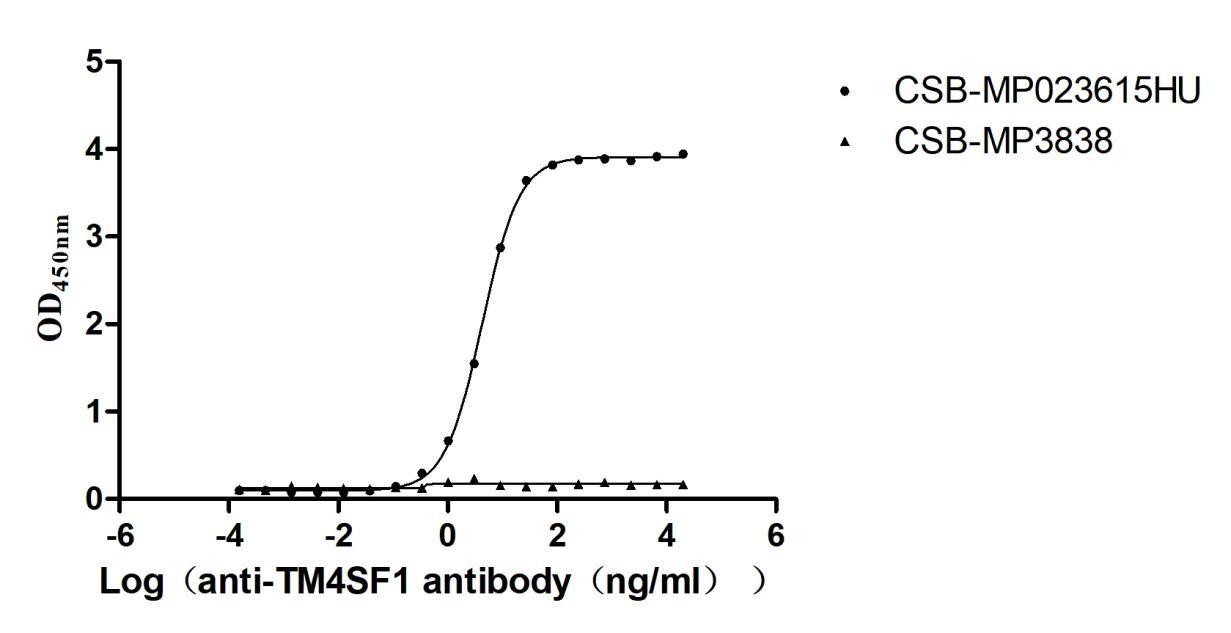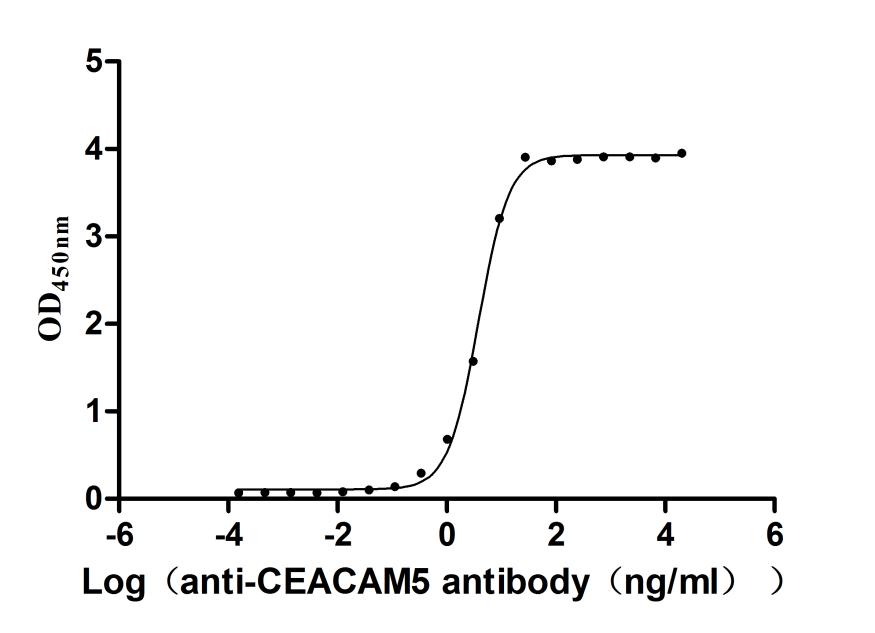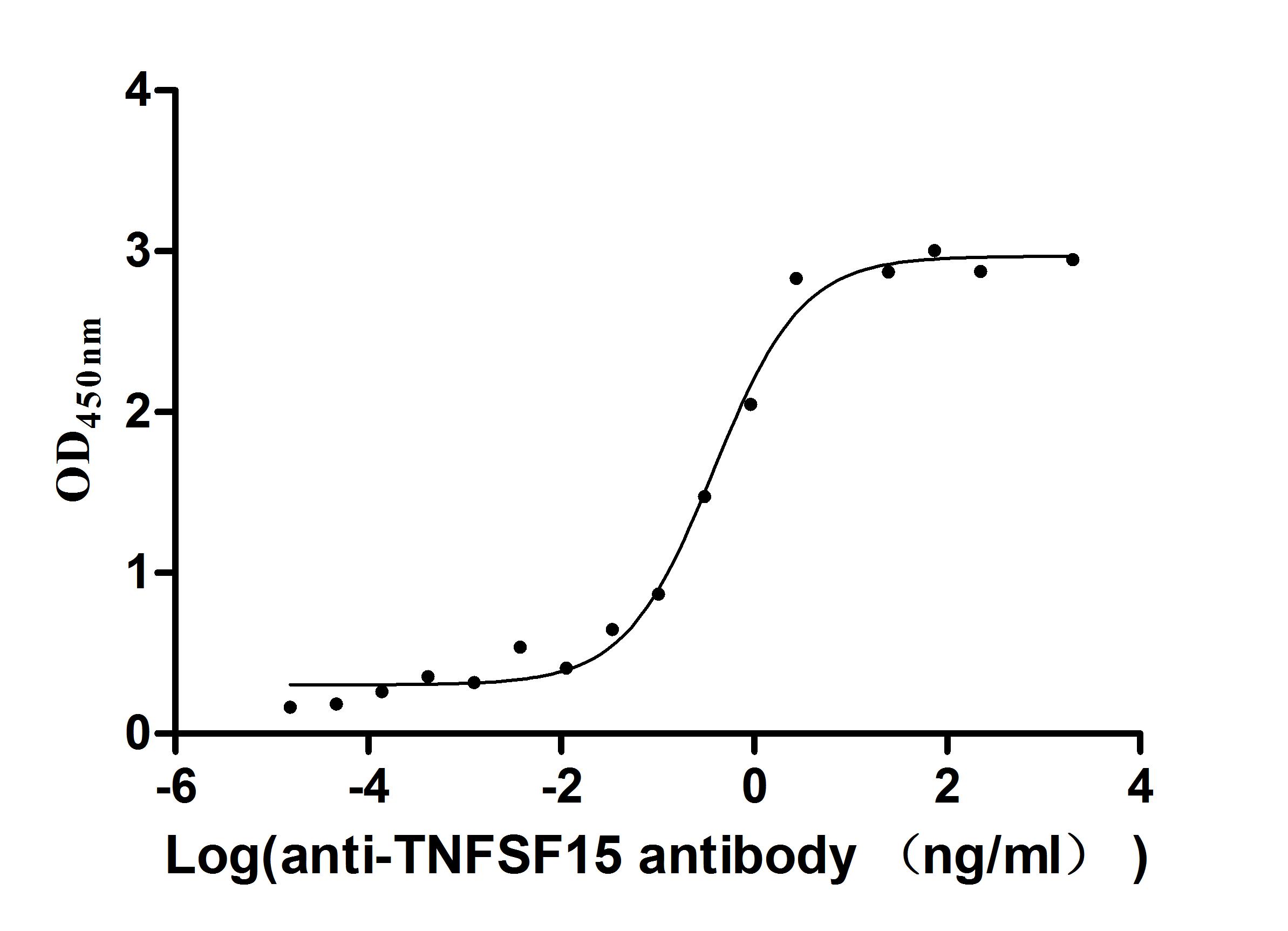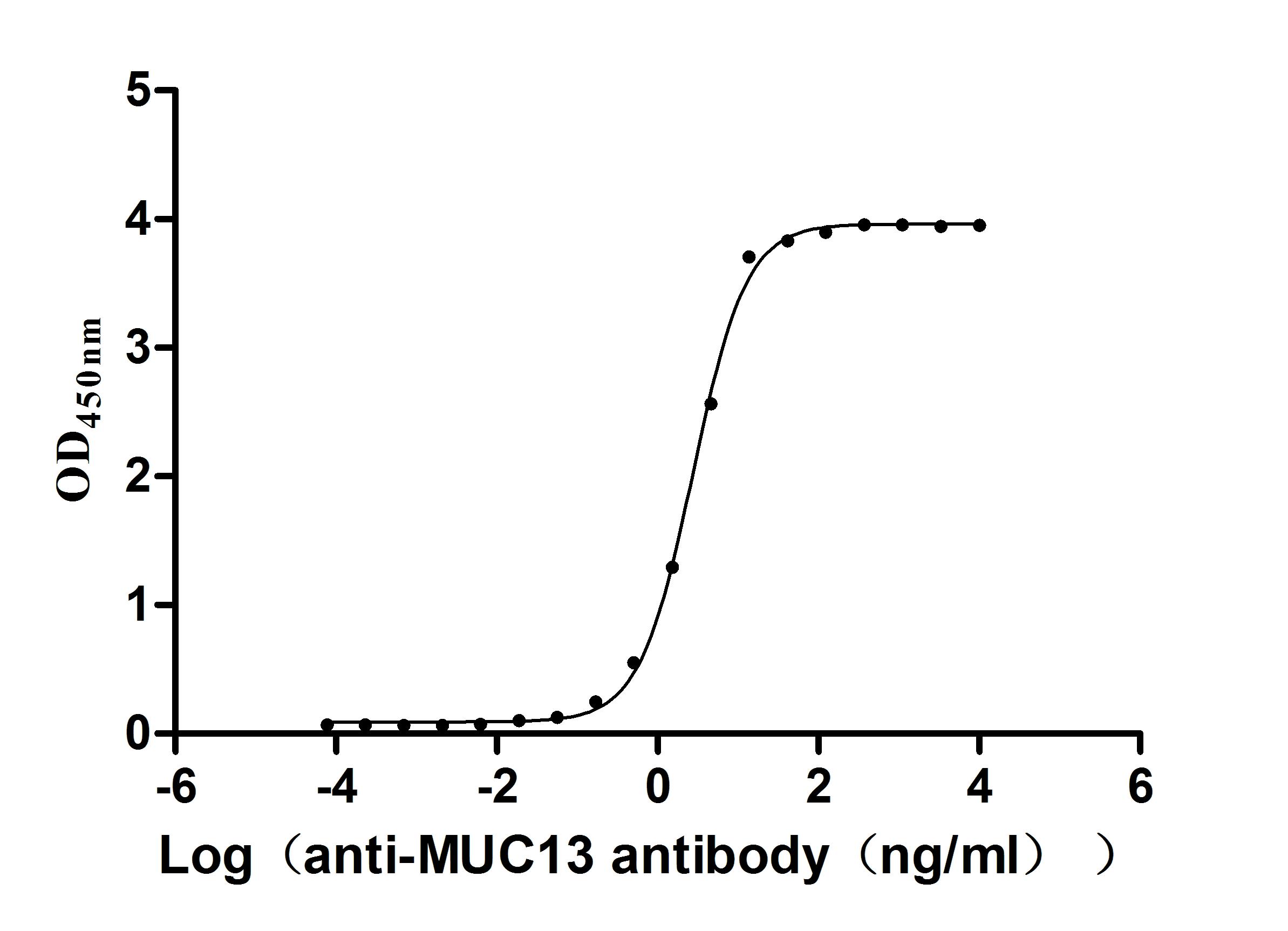Recombinant Human Dipeptidyl peptidase 1 (CTSC), partial
-
中文名称:Recombinant Human Dipeptidyl peptidase 1(CTSC),partial,Yeast
-
货号:CSB-YP006186HU
-
规格:
-
来源:Yeast
-
其他:
-
中文名称:Recombinant Human Dipeptidyl peptidase 1(CTSC),partial,Yeast
-
货号:CSB-EP006186HU
-
规格:
-
来源:E.coli
-
其他:
-
中文名称:Recombinant Human Dipeptidyl peptidase 1(CTSC),partial,Yeast
-
货号:CSB-EP006186HU-B
-
规格:
-
来源:E.coli
-
共轭:Avi-tag Biotinylated
E. coli biotin ligase (BirA) is highly specific in covalently attaching biotin to the 15 amino acid AviTag peptide. This recombinant protein was biotinylated in vivo by AviTag-BirA technology, which method is BriA catalyzes amide linkage between the biotin and the specific lysine of the AviTag.
-
其他:
-
中文名称:Recombinant Human Dipeptidyl peptidase 1(CTSC),partial,Yeast
-
货号:CSB-BP006186HU
-
规格:
-
来源:Baculovirus
-
其他:
-
中文名称:Recombinant Human Dipeptidyl peptidase 1(CTSC),partial,Yeast
-
货号:CSB-MP006186HU
-
规格:
-
来源:Mammalian cell
-
其他:
产品详情
-
纯度:>85% (SDS-PAGE)
-
基因名:
-
Uniprot No.:
-
别名:AI047818; CATC; CATC_HUMAN; Cathepsin C; Cathepsin J; CPPI; CTSC; Dipeptidyl peptidase 1; Dipeptidyl peptidase 1 light chain; Dipeptidyl peptidase I; Dipeptidyl peptidase I exclusion domain chain; Dipeptidyl peptidase I heavy chain; Dipeptidyl peptidase I light chain; Dipeptidyl transferase; DPP I; DPP-I; DPPI; EC 3.4.14.1; HMS; JP; JPD; MGC126959 ; PALS; PDON1; PLS
-
种属:Homo sapiens (Human)
-
蛋白长度:Partial
-
表达区域:25-134
-
氨基酸序列DTPANC TYLDLLGTWV FQVGSSGSQR DVNCSVMGPQ EKKVVVYLQK LDTAYDDLGN SGHFTIIYNQ GFEIVLNDYK WFAFFKYKEE GSKVTTYCNE TMTGWVHDVL GRNW
-
蛋白标签:Tag type will be determined during the manufacturing process.
The tag type will be determined during production process. If you have specified tag type, please tell us and we will develop the specified tag preferentially. -
产品提供形式:Lyophilized powder
Note: We will preferentially ship the format that we have in stock, however, if you have any special requirement for the format, please remark your requirement when placing the order, we will prepare according to your demand. -
复溶:We recommend that this vial be briefly centrifuged prior to opening to bring the contents to the bottom. Please reconstitute protein in deionized sterile water to a concentration of 0.1-1.0 mg/mL.We recommend to add 5-50% of glycerol (final concentration) and aliquot for long-term storage at -20℃/-80℃. Our default final concentration of glycerol is 50%. Customers could use it as reference.
-
储存条件:Store at -20°C/-80°C upon receipt, aliquoting is necessary for mutiple use. Avoid repeated freeze-thaw cycles.
-
保质期:The shelf life is related to many factors, storage state, buffer ingredients, storage temperature and the stability of the protein itself.
Generally, the shelf life of liquid form is 6 months at -20°C/-80°C. The shelf life of lyophilized form is 12 months at -20°C/-80°C. -
货期:Delivery time may differ from different purchasing way or location, please kindly consult your local distributors for specific delivery time.Note: All of our proteins are default shipped with normal blue ice packs, if you request to ship with dry ice, please communicate with us in advance and extra fees will be charged.
-
注意事项:Repeated freezing and thawing is not recommended. Store working aliquots at 4°C for up to one week.
-
Datasheet :Please contact us to get it.
相关产品
靶点详情
-
功能:Thiol protease. Has dipeptidylpeptidase activity. Active against a broad range of dipeptide substrates composed of both polar and hydrophobic amino acids. Proline cannot occupy the P1 position and arginine cannot occupy the P2 position of the substrate. Can act as both an exopeptidase and endopeptidase. Activates serine proteases such as elastase, cathepsin G and granzymes A and B. Can also activate neuraminidase and factor XIII.
-
基因功能参考文献:
- expression markedly increased in the maternal vascular endothelium in subjects with preeclampsia compared with normal pregnant controls PMID: 28878298
- A compound mutation consisting of a large deletion and a nonsense mutation, which provides a new insight in the mutation type of CTSC gene. PMID: 26385525
- CTSC gene missense mutation is responsible for Papillo- Lefevre syndrome in a Turkish family. PMID: 27062382
- analysis of fluorescent substrates provides a detailed S' specificity study of cathepsin C PMID: 27746119
- Mutation screening of the CTSC gene from the two patients revealed the presence of the same homozygous nonsense mutation in Papillon-Lefevre syndrome and Haim-Munk syndromes. Phenotypic variants of the same rare disease caused by mutations of the cathepsin C (CTSC) gene. PMID: 26205983
- Neutrophilic Cathepsin C Is Maturated by a Multistep Proteolytic Process and Secreted by Activated Cells during Inflammatory Lung Diseases. PMID: 26884336
- CTSC was associated with albuminuria in type 2 diabetes patients. PMID: 26631737
- Homozygous mutation 901G>A in exon 7 of CTSC gene is associated with Papillon-Lefevre syndrome. PMID: 27060303
- Results identify a missense mutation in CTSC gene that segregate within a family with Papillon-Lefevre syndrome. PMID: 25799584
- Papillon-Lefevre syndrome cause by homozygous nonsense mutation of cathepsin C gene. PMID: 24894642
- CatC has a role in the selective tuning of innate and adaptive immune responses, relevant to a chronic immune disease, such as atherosclerosis. PMID: 25395616
- cathepsin C in GCF does not seem to have an effect on the pathogenesis of periodontal diseases. PMID: 24949444
- The present account of the 148.621 kb homozygous deletion on chromosome 11 is the first report of a mutational mechanism encompassing the whole CTSC gene. PMID: 23556547
- CTSC mutations in 5 Iranian families with Papillon-Lefevre syndrome (PLS)analyzed; modeled the protein for mutations found in 2 of them; presence of this mutation provides evidence for founder CTSC mutations in PLS; this P35delL mutation leads to loss of a leucine residue; results indicate the phenotypes in these 2 patients likely due to CTSC mutations PMID: 24374475
- Report novel deletion mutation in CTSC gene in Hungarian family with Papillon-Lefevre syndrome. PMID: 23397598
- Cathepsin C gene 5'-untranslated region mutation in papillon-lefevre syndrome in 4 unrelated families in Slovenia PMID: 23108224
- The novel loss-of function mutation of CTSC gene (c.203 T > G) found in Papillon-Lefevre Syndrome patients correlated with their diminished enzymatic activity. PMID: 23311634
- present a catalytic model derived from the relative rates of the acylation vs deacylation half-reactions of cathepsin C. PMID: 22928782
- The Cathepsin C releases the glycosidases from complexes formed with cathepsin A, and reinstates their activity. PMID: 22532132
- Two Indian siblings present with Haim Munk syndrome (HMS) and its cardinal features including palmoplantar keratoderma, periodontitis. arachnodactyly, acroosteolysis, onychogryphosis, osteopenia as well as allelic mutation of cathepsin C exon 6 codon. PMID: 21393975
- Processing of human protryptase in mast cells involves cathepsins L, B, and C. PMID: 21742978
- A novel mutation in the cathepsin C gene is reported in a Pakistani family with Papillon-Lefevre syndrome. PMID: 20236208
- This report described a novel mutation (c.267-268del)in a family with Brazilian Papillon-Lefevre syndrome and presented a review of all cathepsin C (65) mutations reported to date. PMID: 20359428
- study identified an identical recurrent missense mutation, R272P, in 3 families with Papillon-Lefevre syndrome(PLS); presence of this mutation in families from 2 different geographical areas provides evidence for founder effect for CTSC mutations in PLS PMID: 19816003
- Sequencing of the mutant cathepsin C transcript revealed that it lacked exon 3, resulting in a frameshift and introduction of a premature termination codon in Papillon-Lefevre syndrome. PMID: 11914041
- Selective inhibition prevents the partial processing of procaspase-3 in CD3-activated human CD8(+) T lymphocytes PMID: 12080079
- Identification of a novel cathepsin C mutation (p.W185X) in a Brazilian kindred with Papillon-Lefevre syndrome. PMID: 12083812
- All Papillon-Lefevre syndrome affected individuals from three Indian families showed three novel homozygous nonsense mutations in CTSC. PMID: 12857359
- Three novel CTSC missense mutations found in 21 Papillon-Lefevre syndrome families, and a complete loss of CTSC function appears to be necessary for the manifestation of this phenotype. PMID: 14974080
- homozygous deletion of 7 nucelotides in exon 4, creating a premature stop codon 11 amino acids downstream; 2 heterozygous missense mutations in exon 7: 1) substitution of leucine by arginine; 2)changing tryptophan to serine. PMID: 15111626
- This report describes the apparent reason why the study of the natural history of human patients with Papillon-Lefevre syndrome has failed to detect a generalized T cell immunodeficiency phenotype. PMID: 15585850
- DPP-I may play a role in converting endogenous beta-melanocortin MSH(5-22) to more potent peptides that regulate energy homeostasis in the hypothalamus. PMID: 15985311
- The structure of the inhibitor complex provides an explanation of the substrate specificity of hDPPI, and gives a background for the design of new inhibitors. PMID: 17020538
- inhibition of activation of multiple serine proteases with a cathepsin C inhibitor requires sustained exposure to prevent pro-enzyme processing PMID: 17535802
- Novel mutations in two Chinese patients with Papillon-Lefevre syndrome PMID: 17652201
- G386R missense mutation and an intragenic deletion spanning exons 3-7 and homozygous splice site mutation, p.A253SfsX30 found in papillon-Lefevre syndrome PMID: 17943190
- study aimed to identify CTSC mutations in different Papillon-Lefevre phenotypes, including atypical forms and isolated pre-pubertal aggressive periodontitis PMID: 18294227
- Cathepsin C propeptide interacts with intestinal alkaline phosphatase (IAP) and heat shock cognate protein 70. The propeptide of cathepsin C may stimulate the sorting to the lysosome contributing to the degradation of IAP in Caco-2 cells. PMID: 18307834
- gene variants contribute to increased susceptibility in generalized aggressive periodontitis PMID: 18809751
- Mutations of the cathepsin C gene are probably responsible for the phenotype of Papillon-Lefevre syndrome in this family. PMID: 18841559
显示更多
收起更多
-
相关疾病:Papillon-Lefevre syndrome (PLS); Haim-Munk syndrome (HMS); Periodontititis, aggressive, 1 (AP1)
-
亚细胞定位:Lysosome.
-
蛋白家族:Peptidase C1 family
-
组织特异性:Ubiquitous. Highly expressed in lung, kidney and placenta. Detected at intermediate levels in colon, small intestine, spleen and pancreas.
-
数据库链接:
HGNC: 2528
OMIM: 170650
KEGG: hsa:1075
STRING: 9606.ENSP00000227266
UniGene: Hs.128065
Most popular with customers
-
Recombinant Human Secreted and transmembrane protein 1 (SECTM1), partial (Active)
Express system: Mammalian cell
Species: Homo sapiens (Human)
-
Recombinant Human 5'-nucleotidase (NT5E) (Active)
Express system: Mammalian cell
Species: Homo sapiens (Human)
-
Recombinant Human Transmembrane 4 L6 family member 1(TM4SF1)-VLPs (Active)
Express system: Mammalian cell
Species: Homo sapiens (Human)
-
Recombinant Human Cadherin-1(CDH1),partial (Active)
Express system: Mammalian cell
Species: Homo sapiens (Human)
-
Express system: Mammalian cell
Species: Macaca mulatta (Rhesus macaque)
-
Express system: Mammalian cell
Species: Homo sapiens (Human)
-
Recombinant Human Mucin-13(MUC13),partial (Active)
Express system: yeast
Species: Homo sapiens (Human)


